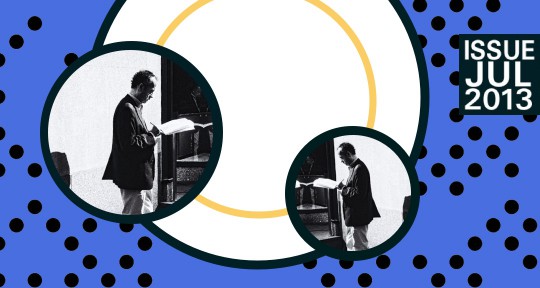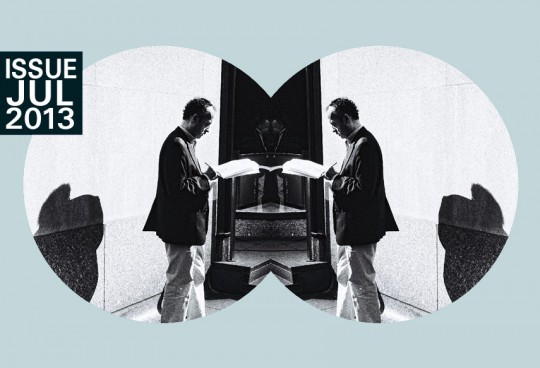We have organized four IndieGoGo campaigns in all our eight years now, and each of the last three times, it’s sucked so much life force from us that we have, on one occasion, even had to skip an issue (there is no Spring 2015 edition) to recover from it. For some reason, however, it does not take long at all after our first campaign to hit our stride again. A sampling of what we were up to immediately after April 2013, apart from sending ‘thank you’s and perks to 231 supporters: We (1) launched our first-ever translation contest; (2) organized a massive translation project that saw translations into eighteen additional languages of Jonas Hassen Khemiri’s brilliant send-up of racial profiling; (3) revamped our website to include a map (thus allowing readers to access our content by geographical region); (4) nominated ourselves for a TED Prize (albeit in vain) and, last but not certainly not least; (5) held our largest recruitment drive ever. The rapid expansion takes a toll: my inbox is invaded daily by check-ins. Fortunately, around this time, we migrate to Trello for issue production work. To give you a sense of how much back and forths are required for just one article (say, Can Xue’s interview conducted by Dylan Suher and Joan Hua, as recounted by Dylan below): Trello records 84 comments by 12 team members spanning the period of May 28 to July 15. Here is Robyn Creswell of The Paris Review on the Summer 2013 issue: “It’s hard to read in a heat wave, but the July issue of Asymptote is so absorbing I hardly notice my sweat drops hitting the keyboard. Even more impressive than the diversity of things translated—book reviews in Urdu, fiction in Bengali, poetry in Faroese—is their quality.”
The Summer 2013 issue of Asymptote is a fine illustration of the principle that translation is just a special subset of the general problem of communication: the problem of trying to relate your experience to someone else, of trying to put something “in other words,” of trying to put something into words in the first place. This principle comes across most clearly in Naoki Higashida’s attempts to relate his experience as an autistic person, and in the visual section’s pieces on asemic writing and Ghada Amer’s use of Arabic script. All three remind us what a tentative, unruly enterprise language is. The shapes shackled into service by the Phoenicians millennia ago long to return to the wilds of visuality; when tasked with expressing the plentitude of the autistic mind, simple words seem as crude a tool as a chert axe.
The problem of referentiality epitomized by these pieces runs throughout this entire issue. The way Banaphool’s “Nawab Sahib” (translated by Arunava Sinha) seems to exist just outside the bounds of reality, its repetitive structure, and its surprising twists all suggest a fable (or a joke), but the moral to which it points remains sublimely hazy. E.C. Belli, translating Pierre Peuchmaurd, repeats the word “glimmer” again and again in a mantra of irreducible images: “The glimmers of lakes, of iron, of girls”; “The glimmers of otters inside their prey.” The insistence of the repetition pounds significance into a non-entity of a word.
What you can bring with you—from a foreign language, or from life as a whole—is the subject of my favorite work in this issue, Ottilie Mulzet’s rendition of László Krasznahorkai’s “I Don’t Need Anything from Here.” Krasznahorkai belies the flat conviction of the title over the course of one gloriously sprawling sentence. I don’t speak Hungarian, but I’m fascinated by the complexities of the language—its dozens of cases, its agglutination, its vowel harmony, and its topic prominence—and can imagine what a feat it is to work Krasznahorkai’s original into English. In this piece, as in her other Krasznahorkai translations and in her translations of Szilárd Borbély, Mulzet manages to replicate the rhythm of the original and to turn the grammatical fussiness of English into one of the strengths of the translation. Consider the refrain “I would leave here.” That precise phrasing creates a marvelous ambiguity that would be lost if the “here” appeared anywhere else in the sentence.
The interview with Can Xue that Joan Hua and I conducted—Joan was a full collaborator whose name should not be omitted from citations of this interview and yet often is—also addresses the problem of just trying to get something across. Reading a Can Xue story often feels like reading an esoteric medieval allegory without a key: something is happening here but you don’t know what it is. In this interview, Can Xue speaks with the audacity of someone who knows exactly what she is doing and who is just waiting for a reader enlightened enough to get it, even if it takes another hundred years. When so much text these days seems willing to sacrifice complexity for communicability, I admire her implacable resistance to pandering to the reader, who “must stand up and perform in order to enter the realm of experimental literature”; to the Chinese literary scene, which she mostly dismisses offhand; and even to her interviewers. “Your question lumps my writing together with other writers of the eighties,” she told us, “which shows that you haven’t entered deeply into Can Xue’s works—you need to put more effort into reading!” I was a little stung when I first read that (and a little annoyed, since I had spent a month reading a mountain of Can Xue books), but mostly just charmed by her candor.
We provided a lot of background in this interview for the reader’s benefit, but our questions tended to be broad, which worked well because Can Xue has a very definite idea of what she wants to say through and about her work. We gave her the space to say it. I’ve done a few interviews for Asymptote, but to be honest, I’m usually skeptical about how well most writers can articulate their creative process, and how useful those accounts are to the reader. The last question of our interview asks what the point of such an exercise is, and I think Can Xue gives a decent response: it’s not about illuminating the one authentic meaning of the work; it’s about allowing the writer to offer one interpretation that can stand among many.
Can Xue may come off as intimidating, even arrogant, in this interview, but she was actually very kind and professional throughout the process, and exceedingly generous with her time. I remember one minor disagreement vividly. In the sentence eventually translated as “This is because my sensibility eventually congeals into reason,” I wanted to translate the verb “凝结成的” as “crystallizes into.” Can Xue, who can read English, insisted instead on “congeals,” and since these are ultimately her words, we respected her choice. She is correct that 凝 really does mean “congeal,” but “congeal” is such a singularly disgusting word in English. Nothing good “congeals”; if something congeals at the bottom of a container, you make a face and throw it out. I think the dispute reveals a little bit about Can Xue as a writer, and probably also a little bit about her would-be translator.
Five years is not a very long time, and yet it is long enough for the writing and images that were most familiar to you—even the writing and images you yourself produced—to become uncanny. Asymptote remains unchanged in its broad outlines. This issue from five years ago has the same sections, uses the same basic home page layout, and certainly achieves the same standard of quality we have for the journal today. And with so many similarities between then and now, I find myself drawn to the small changes: different personnel who made different choices, a film featured in the visual art section (I feel like we haven’t done that in a while), an essay on translating a film… Writing about an issue from back then, I imagine I must feel like the writers in this issue’s special feature on self-translated drama: encountering my own work like a stranger, both because it has become strange and because I need to estrange myself from it to explain it to somebody else. How miraculous it is when a translator is able to express someone else’s thoughts—it is already so difficult to express your own.
Dylan Suher has been a contributing editor at Asymptote since August 2012.
*****
Read more from our #30issues30days showcase:


